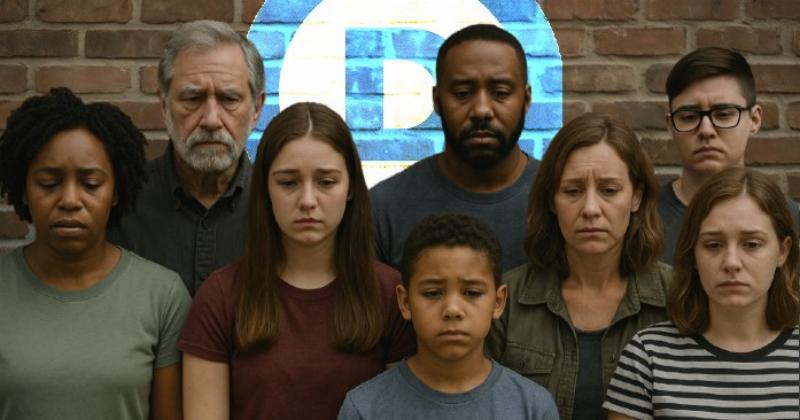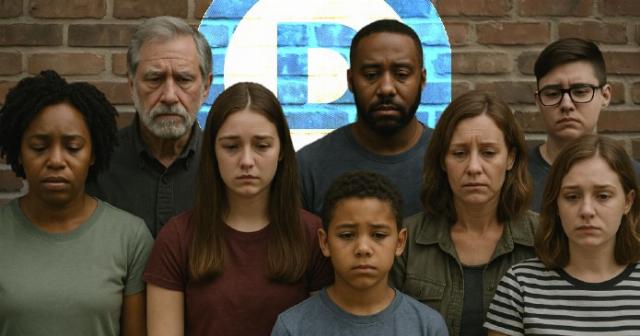


There’s a curious paradox unfolding in American life. Lefties are wealthier, better educated, and more influential among the establishment than ever. They’re also, by nearly every meaningful measure, far less happy than conservatives. It’s not a new phenomenon, but in recent years, the trend has sharpened, widened, and become impossible to ignore.
What good, one might ask, is all the pop-cultural dominance, elite credentialing, high earning, and policy activism, if the result is widespread personal despair?
In June, statistician Nate Silver published an analysis of the 2022 Cooperative Election Study that laid the situation bare: 51% of conservatives reported excellent mental health, compared to just 20% of liberals. That’s not a small gap. It’s a chasm. And it’s consistent. Silver’s findings echoed years of similar data. Mental health, happiness, and life satisfaction skew heavily toward the right. That stands even when adjusting for income, education, and religious attendance.

Image by ChatGPT.
The response to Silver came swiftly, not just from conservatives who saw validation, but from liberals who cried foul. Left-leaning commentators accused conservatives of being numb to injustice, dismissing their happiness as the product of ignorance. But that response only reinforced what conservatives have long argued: liberalism, especially in its modern form, fosters a worldview that invites dissatisfaction. Constant agitation over “systemic oppression,” the “climate apocalypse,” and “intersectional inequality” doesn’t leave much room for joy.
This isn’t just about adults either. The trend begins early...and it’s getting worse.
A comprehensive Columbia University study surveyed over 86,000 twelfth-graders across thirteen years and found a marked rise in depressive symptoms among liberal teenagers, especially girls. Progressive youth are not just more anxious. They’re markedly more likely to describe themselves as mentally unwell. The implication is as troubling as it is clear: the liberal emphasis on grievance and identity has created a generation raised to see themselves as under siege.
The 2022 American Family Survey reinforced this reality. Liberals, particularly women aged 18-55, were 15-18% less likely than conservatives to describe themselves as completely satisfied with their lives or their mental health. What separates the groups? In part, it’s family. Conservatives are more likely to prioritize marriage and children—bedrocks of personal stability—while liberals increasingly reject or delay these in favor of careerism, activism, and abstract causes.
The pattern holds across every serious data set.
The American Affairs Journal, in a 2023 review, noted that liberals were consistently twice as likely to report mental illness compared to conservatives, regardless of whether they attended church. Ryan Burge, the political scientist behind the analysis, found that this wasn’t a fluke. It was systemic. Something in the liberal outlook itself appears to degrade mental resilience.
Another survey, from the Survey Center on American Life, highlighted just how specifically this crisis afflicts young liberal women. Among all political subgroups, they reported the lowest levels of satisfaction with how society treats them and the highest levels of distress. This should be unsurprising, as the liberal narrative trains people to feel perpetually aggrieved. Especially women, despite the left’s notorious trouble defining what a woman truly is.
Still, some researchers resist drawing hard conclusions. A 2023 Northeastern University analysis acknowledged the stark liberal-conservative mental health divide but attributed part of it to “self-reporting bias.” Liberals, they said, may just be more open to discussing their struggles. That might be true to a degree. But even when controlling for self-awareness, the overall disparity persists. A Tufts Public Opinion Lab study that adjusted for age, religion, and income still found conservatives were eight percentage points more likely to rate their mental health positively.
By now, the pattern is hard to dismiss. The ideological divide in happiness isn’t anecdotal. It’s measurable.
Yet some people in academia, itself overwhelmingly leftist, see things another way. A 2024 Johns Hopkins study tried to narrow the divide, suggesting that higher liberal depression rates might reflect emotional honesty rather than emotional dysfunction. But honesty doesn’t erase the harm. Being depressed more often, even if you’re willing to admit it, still means you’re suffering more. That should matter.
Some researchers, like those behind a 2025 PLOS One study, raised a different critique: maybe conservatives downplay mental health struggles due to stigma. Possibly. But the same study acknowledged that across objective well-being metrics—mood, stress, life satisfaction—liberals still reported worse outcomes. So even if language differs, the deeper trend remains.
Newsweek summed it up cleanly in May, citing a joint study by Tufts and UMass: conservatives are significantly more likely to rate their mental health as “excellent” or “very good,” while liberals are more prone to report stress, anxiety, and dissatisfaction. Awareness of social issues, the researchers said, might explain the disparity. But others see it differently: constant fixation on societal ills may feel virtuous, but it actually corrodes the human psyche, causing emotional self-harm.
And here’s the truly revealing twist: the liberal cohort suffering most isn’t the poor or disenfranchised. It’s the elite.
The Manhattan Institute found that college-educated white liberals now dominate the Democratic Party’s internal culture. Affluent, urban-to-suburban, and fiercely ideological, they’ve pushed the party away from bread-and-butter economics toward academic-style social theory. In theory, they’ve won the culture war. In practice, they’re miserable.
The Atlantic documented how well-off liberal suburbs like Scarsdale, New York—where median incomes top $250,000—maintain rigid zoning laws that block working-class families from moving in. Lefties talk inclusion, particularly to each other and especially when they all have money. However, they practice exclusion. They champion diversity, equity, and inclusion, while building echo chambers far away from blue-collar America, let alone the poor.
Conservatives don’t claim perfection. That’s good, because they have no secret formula for it. Not even close.
Here’s what they do offer: a worldview grounded in, more or less, personal responsibility, self-confidence, family ties, public safety, opposition to reinventing working wheels, biological sex’s immutable reality, disdain for government actions that hamper ordinary people, hard truth over academic theory, rejecting societal upheaval masquerading as “social justice,” ending children’s indoctrination into woke ideology, tackling runaway costs of living, and national pride, among other things. All this produces lives of a higher quality. The liberal model, for all its prestige, doesn’t.
If you take people at their word, and these surveys do, then it becomes impossible to avoid an unsettling question: what has the left’s political project really delivered? For all the marches, for all the legislative victories, for all the online moralizing, has it made the people who practice it any happier? The general answer, in data point after data point, is no.
This is not about dunking on the other side. It’s about outcomes. Regardless of whether one calls it “woke,” “liberal,” “progressive,” “intersectional,” or something else, lefty ideology does something rather obvious. It leaves its adherents more anxious, more alienated, and more depressed over time, even as their material conditions improve. On this basis, it’s long past time to question leftism’s real-world value.
Considering how displeased its adherents are, the answer seems far from complimentary for their team.
Mental health matters. Happiness matters. These aren’t luxuries. They are the building blocks of any flourishing society. And right now, the evidence says conservatives, not liberals, are doing a better job at leading lives of meaning, stability, and peace.
That’s not a partisan slogan. It’s reality.
Dr. Joseph Ford Cotto hosts and produces News Sight, speaking the data-driven truth about economic and political issues that impact you. During the 2024 presidential election, he created the Five-Point Forecast, which correctly predicted Trump's national victory and the outcome in all swing states. The author of numerous nonfiction books, Cotto holds a doctorate in business administration and is a Lean Six Sigma Certified Black Belt. During 2014, HLM King Kigeli V of Rwanda bestowed a hereditary knighthood upon him. It was followed by a barony the next year.
